iText DITO® – Powering the digital future of civil records in Belgium
Digital storage and distribution of information is the future. That’s why the DABS (Databank voor de Akten van Burgerlijke Stand or Database of Civil Registry Records) project was initiated by the Belgian government. This cooperative project between the Department of Justice, Department of Internal Affairs (including the National Register), Department of Foreign Affairs, Municipalities and Consulates and many other government departments is an initiative that has been coordinated by the Dienst Administratieve Vereenvoudiging (DAV) or Administrative Simplification Service.
Read on to learn how iText DITO® is being used to revolutionize citizen certification inside (and outside) Belgium.
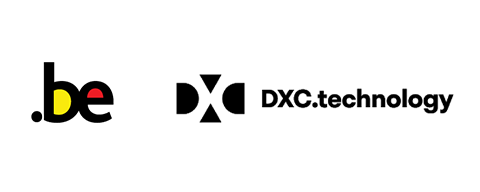
Background
The DAV or Administrative Simplification Service was established in Belgium in 1998 and was initially instructed to propose measures to reduce the administrative complexity for companies and the costs associated with this administration. In 2003 this assignment was extended to include simplification actions for citizens, which is where the DABS or Database of Civil Registry Records project comes in.
The DABS project’s aim is to centralize all citizen certifications (birth, marriage, death, recognition, adoption, change of nationality…) in one large digital database, and make the process entirely electronic from start to finish.
Traditionally in Belgium, citizen information was held by local authorities, each with their own template for creating every type of certificate. This meant that to access a person’s records such as a birth certificate, they had to be requested from the person’s respective local authority. Meanwhile citizens would need to travel to their place of birth in order to request a copy of the certificate in person.
This system had been in place since the time of Napoleon, and in the modern world caused a significant amount of administrative complexity and wasted time. The new electronic system would allow both authorities and citizens easier access to records, both inside and outside Belgium.
DXC Technology was awarded the contract to coordinate the project from a technical point of view and to implement a digital solution replacing this outdated methodology. DXC approached iText as they recognized our expertise in PDF technologies and had been a trusted partner in the implementation of several previous projects at the FPS Justice and others.
Goals
- To create citizens’ civil state certifications in one central database in a dematerialized format
- To request extracts from a certificate independently of the place where the certificate was created
- To reduce administrative complexity and wasted time
- To completely replace the existing non-digital document workflow
- To support all required languages: French, Dutch and German
Challenges
Based on their experience with the iText SDK during the JustX project, DXC initially planned on developing a custom template solution using iText 7 Core to handle the requirements for each type of document. With this in mind, they had begun coding the required PDF templates.
However, during the initial development stage in February 2018 they contacted iText to see if there were any other possibilities to aid their development. During these discussions iText recognized that this project would be the perfect test-case for their latest innovation – iText DITO®, a powerful PDF template engine which combines iText’s proven abilities in mass-producing high-quality PDFs, with a graphical interface for designing templates.
iText DITO was developed to give both developers and non-developers a way to design and maintain templates to produce PDFs without any programming. Instead users are able design their templates visually and can link data from various sources to elements of the template in the same way.
iText worked with DXC to develop proof of concept templates from examples of the existing non-digital document workflow. The templates that were prepared were well received. DXC could immediately see the added value of iText DITO and that it would prove to be an enormous time saver compared to their planned approach.
It was clear that designing the templates visually would be a much better solution and enable more customizability of templates. In addition, the ability to define the data binding functionality in the editor would also be a boon to development.
In turn, iText was able to use the feedback from DXC to influence the development of iText DITO as a product, in order to implement the features and functionality required for the solution DXC was developing. By working together closely, both companies benefitted from the collaboration.
Offered solution
How the iText DITO solution transforms public record management
By using iText DITO’s template designer, each certificate template can be unified into a standardized format, which is used for both printed and online versions. However, it can also be easily customized for each local authority’s needs - for example to use their own logo for every type of certificate. With almost 600 different local authorities included in the scheme, this could be a complex task using conventional coding methods.
Unlike traditional template solutions, iText DITO enables quick and easy updates to templates when content changes are required such as when the law changes. With hardcoded templates, even slight edits require recoding and testing to be carried out, wasting valuable development time and resources. Not so with iText DITO.
Thanks to the intuitive graphical interface, designing templates can be carried out without requiring extensive training or technical knowledge, and because of its browser-based technology it can be used on virtually any device, with no software installation required.
As local authorities may have their own IT partner arrangements, with specific applications already developed to enter data digitally, they were not required to change their existing software. Instead the data required for a certificate is transmitted using a web service developed by DXC. The web service then takes the data and converts it into the widely used JSON (JavaScript Object Notation) format. The iText DITO SDK takes the data and injects it into the appropriate template, and then generates the required PDF certificate.
As with all PDFs generated with iText technology, they are standards-compliant and highly compatible, and iText DITO supports the latest PDF 2.0 specification.
The generated certificate is then handed off to a separate system to be digitally signed, making it a legally recognizable document that can be used by multiple governmental organizations. In addition, extracts of documents can be quickly and easily verified with the use of a QR code, which is added using iText 7’s Core library.
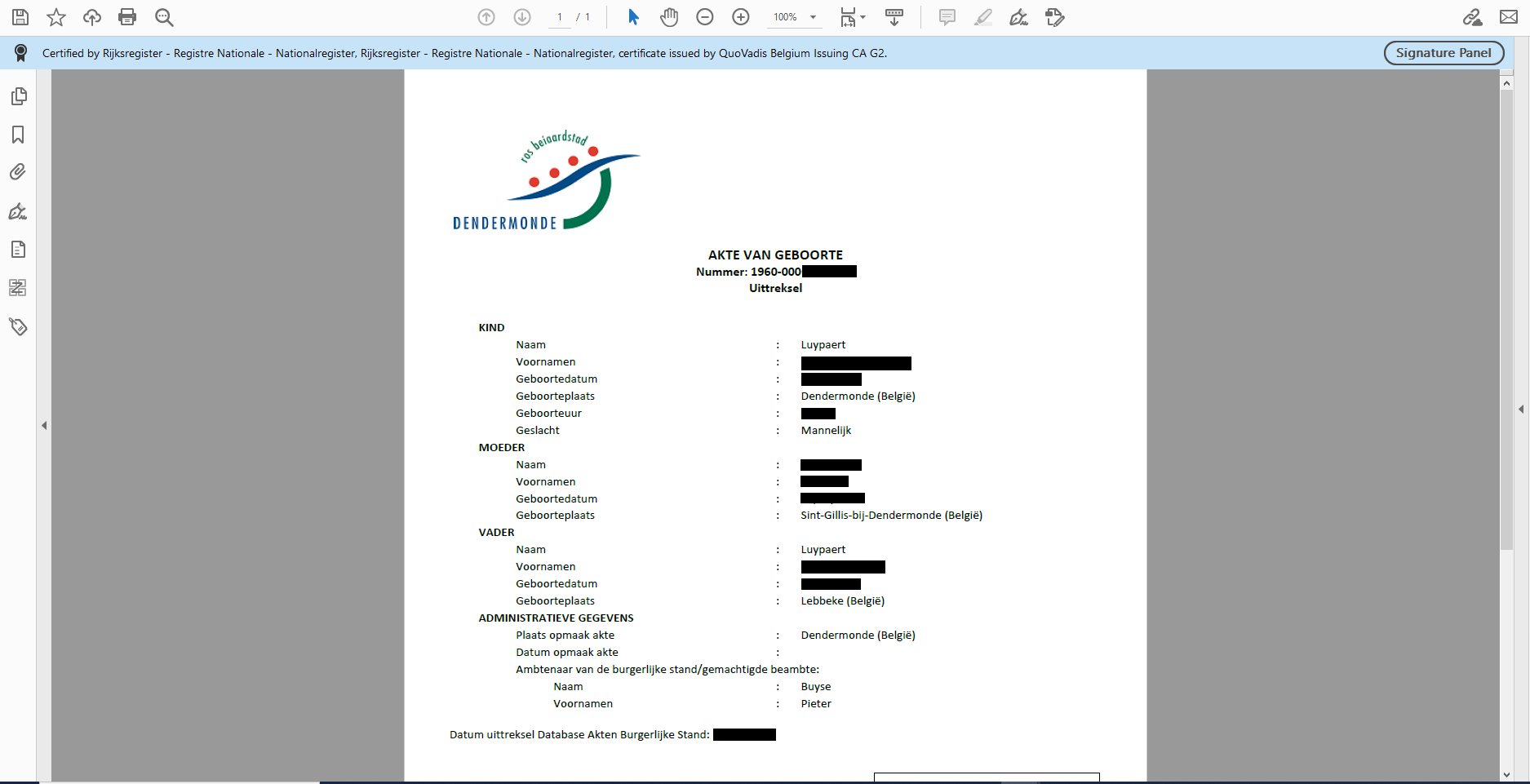
Result
The digital civil registry has been in operation since 31st March 2019. From that date all civil status records are now digitally created and recorded in the DABS central database. This means that in 581 municipalities across Belgium and 102 consulates abroad, paper deeds are finally a thing of the past for citizens.
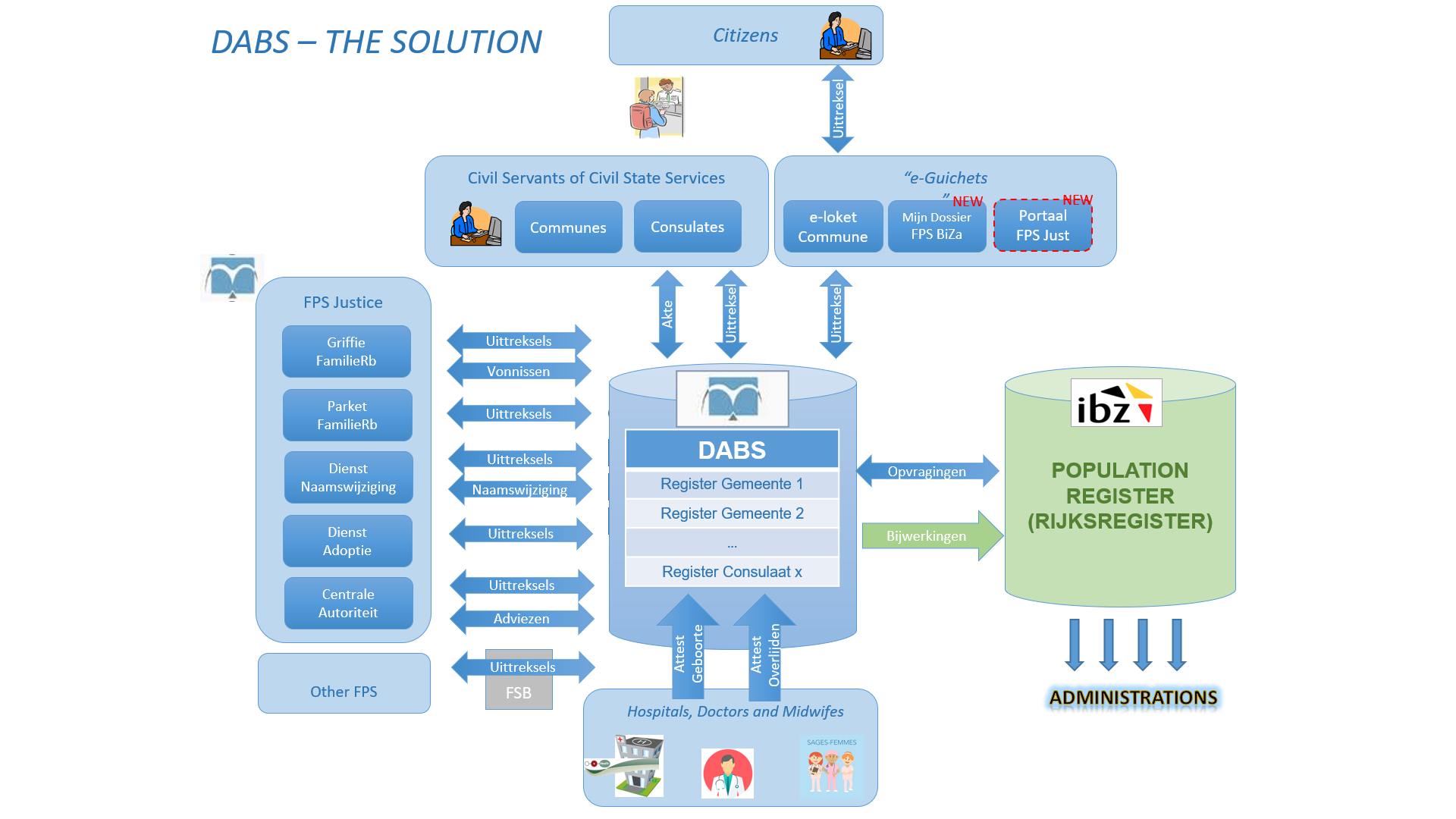
For example, drafting documents such as birth or marriage certificates no longer requires a pen and paper. Civil servants from both the municipalities and Belgian consulates can instead sign the documents digitally and store them in the central database, from where extracts and copies can easily be accessed.
Citizens are no longer required to make long journeys in order to obtain copies or extracts of documents. Instead, they can go to their local residential authority or use an “e-loket” electronic portal, which significantly reduces time and costs. Thanks to the increased speed of communication and data exchange it also ensures more legal certainty (e.g. divorces can be processed up to a month and a half faster).
Compulsory digitization also has the benefit of eliminating the inconvenience of storing and updating millions of paper deeds in town halls and courts. Paper archives can now go into long-term storage as they no longer need to be quickly accessible, which also cuts costs.
An additional benefit is that judgments related to civil state facts are handled automatically, which reduces the operating costs for the municipalities.
At the federal government level, the clerks are no longer required to draft and send judgment bulletins to the registry office. This means no need to update and store the duplicates of the deeds. Public prosecutors can perform their supervisory function in a modern and centralized manner, and their workload is also decreased due to the fact that municipalities can correct errors themselves.
The project to digitalize the civil registry has been a great success. In fact, in December 2019 the project received the Agoria e-Gov Award for Best Project of 2019. It was also declared the winner of the award in the Profitability subcategory.
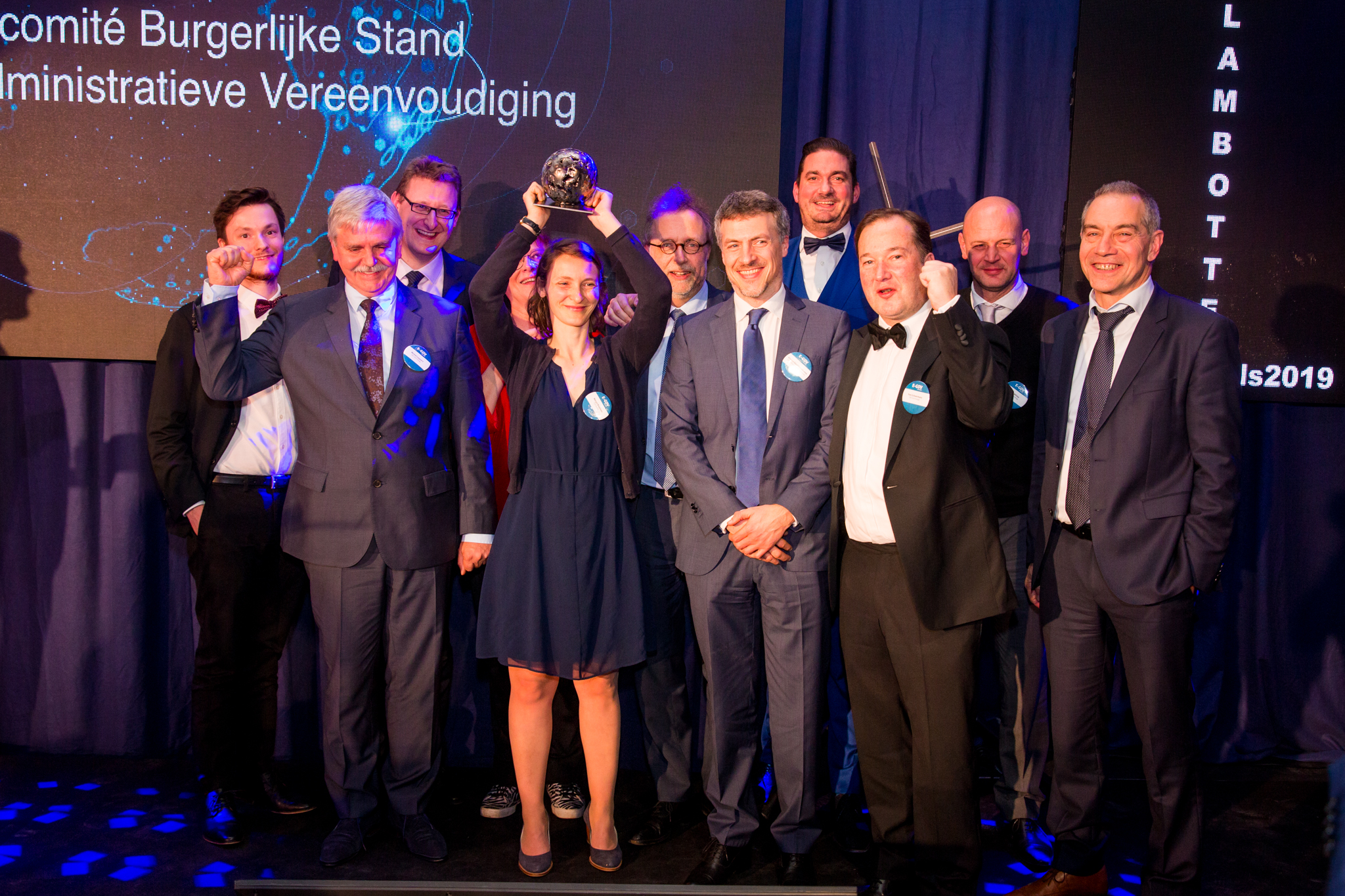
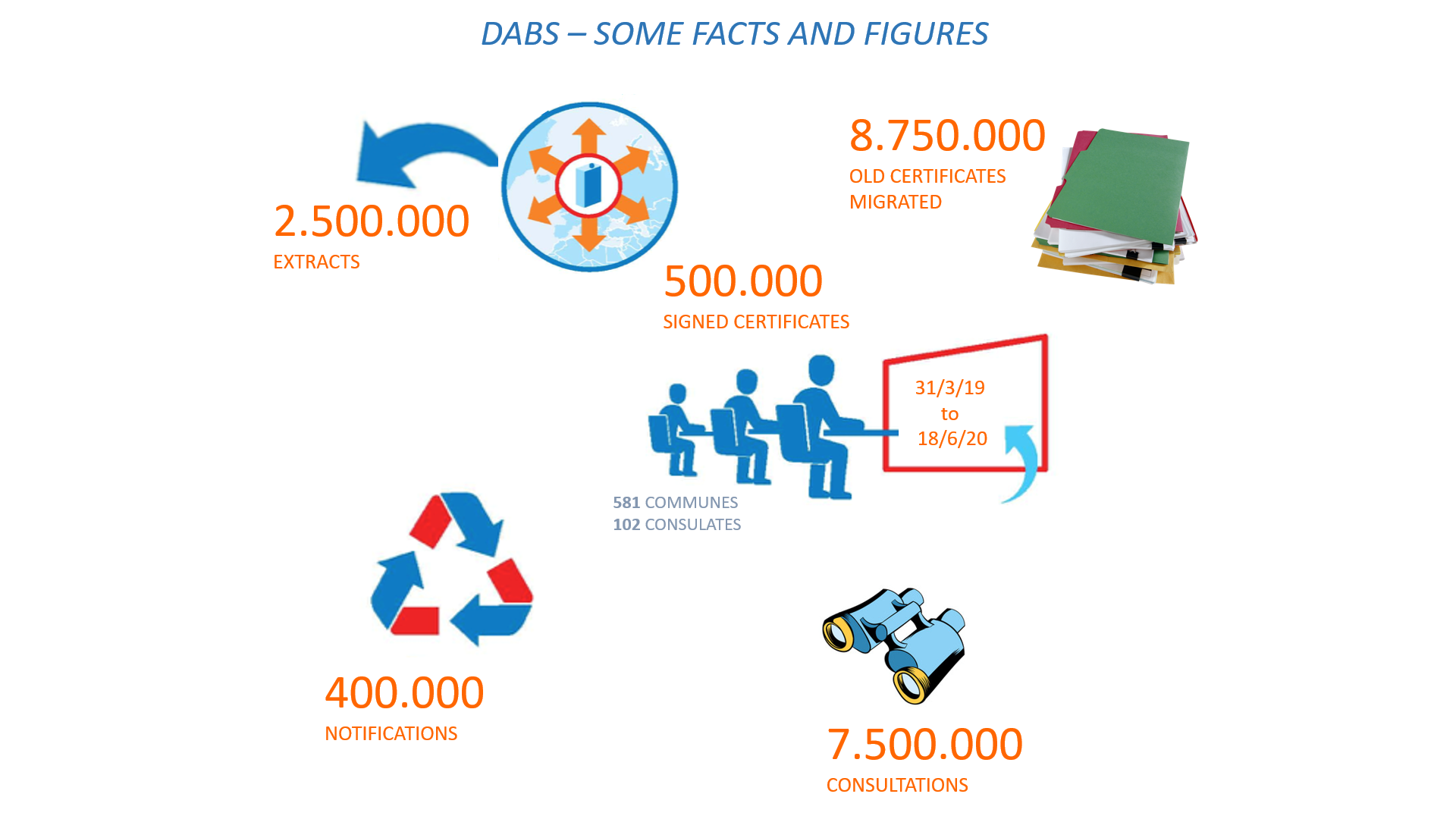
It’s no wonder, when you consider impressive figures like 8.75 million old deeds migrated, or annual savings of 39.6 million euros in administration costs for citizens, businesses, municipalities and the federal government.
There are also significant benefits to the environment, as thanks to the convenience of the new system it is estimated that over 7 million sheets of paper will be saved each year.
The DABS solution using iText DITO unites the data and workflow from all local authorities in the Flemish, Walloon, and Brussels-Capital regions of Belgium, and supports all three languages used by the administrations.
Since the launch, our administrative work has become much simpler, and access to information is easier for both civil servants and citizens.
Erwin De Pue - Director General: Dienst Administratieve Vereenvoudiging (DAV)
Our solution needed to unify data from almost 600 local authorities across Belgium and allow the production of civil records in a standardized, legally-compliant format.
iText DITO allowed us to quickly design and configure the templates we required and generating high-quality PDF documents on a massive scale was no problem.
We also appreciated the support from the iText development team and their willingness to implement new features and functionality as required.
Michel Luypaert - Program Manager: DXC Technology
iText DITO helped with this project, could it help with yours?
Now you’ve learned how iText DITO contributed to the Databank van Akten van de Burgerlijke Stand (DABS) project’s success, what could it do for you?
Leverage data wherever it resides
The iText DITO SDK can leverage information from your chosen data source, whether it’s from an input form, RESTful API, a database, or wherever your data is stored.
Empower business users to own their templates
With its intuitive graphical template designer, you can train anyone to be a template design wizard in little or no time. No need to rely on expensive professional designers or software; templates can be designed and maintained by the people who actually use them.
Mass-produce state-of-the-art PDFs
Being a highly scalable template engine, iText DITO can be used to design and deploy any number of templates and produce however many PDFs you require, with support for the latest PDF 2.0 standard and PDF/UA output. Unlike many other template solutions, it is truly enterprise-grade and can grow with your needs.
WYSIWYG template design editor
The iText DITO Editor allows users to visually design templates using rich text, forms and subform elements, tables, images and more. The templates you design can contain both static and dynamic content. Static content is content that will be printed on every document based on a template. Dynamic content is variable content, typically defined by data bindings, conditional statements, or formulas.
Reduce cost and delivery time of document automation projects
iText DITO allows your development team to focus on what’s actually important – development. By enabling business users to take care of template design and maintenance, developers are no longer required to spend valuable time coding, recoding, and testing templates whenever changes need to be made.
Simple and flexible deployment
Deploying iText DITO is easy. The iText DITO SDK which generates your documents is available as a Docker image, native Java, or a Windows CLI application, meaning it can be implemented in any software environment. The iText DITO Editor can run in a browser locally or on your intranet, allowing it to be accessed from anywhere with no software installation required.
Supports multiple languages and complex writing systems
Another key benefit of iText DITO is its support for global language/ligature support. Templates can be created for use with multiple languages which can be rendered correctly thanks to its ability to use complex writing systems and fonts.
Embedded template resources
Templates and their resources are embedded within an iText DITO Project file. Project files are template packages which include all the resources required for each template, such as images, fonts, CSS for custom styling, and a JSON data structure file to define data bindings for templates. There is no limitation on the number of projects you can create, and they can be exported and stored in local or shared locations.
Conditional logic for content visibility and formatting
You can show or hide sections of your generated documents based on conditions and add text formatting to conditions, allowing you to style data bindings depending on their value.
Filtered loops
With filtered loops you have a straightforward mechanism to build tables with repeating rows that show a filtered subset of the items in an array
PDF/UA Compliance Assistant
Offers a guided experience to help you design templates that will generate PDFs that comply with the PDF standard for Universal Accessibility (PDF/UA). Such PDFs are optimized for assistive technologies and are essential for compliance with accessibility regulations such as Section 508 of the United States Rehabilitation Act which specifies that PDF documents must be PDF/UA compliant to allow people wider access to information.
Password protection for generated PDFs at the API level
You can set user passwords which prompt users to fill out a password to open the document, owner passwords which prompts users to fill out a password to interact with the document, or both. Protection levels can be set through the Encryption Properties of the PDF Producer operation.
Barcode generation wizard
You can generate both two-dimensional and three-dimensional barcodes from input data contained in the JSON payload. The wizard consists of three steps to insert a scannable barcode into your template.
About DXC
As the world's leading independent, end-to-end IT services company, DXC Technology leads digital transformations for clients by modernizing and integrating their mainstream IT, and by deploying digital solutions at scale to produce better business outcomes. The company’s technology independence, global talent, and extensive partner network enable 6,000 private and public-sector clients in 70 countries to thrive on change.
Want to learn more about iText DITO®?
Discover the power of building interactive form templates online with a guided demo from the iText engineering team.